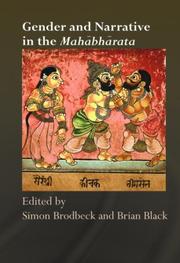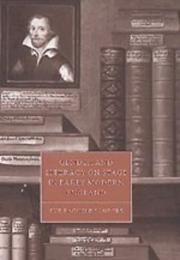| Listing 1 - 10 of 481 | << page >> |
Sort by
|

ISBN: 0415415403 9780415415408 9780415544719 0415544718 Year: 2007 Publisher: London: Routledge,
Abstract | Keywords | Export | Availability | Bookmark
 Loading...
Loading...Choose an application
- Reference Manager
- EndNote
- RefWorks (Direct export to RefWorks)

ISBN: 0521582342 Year: 1998 Publisher: Cambridge, UK New York Cambridge University Press
Abstract | Keywords | Export | Availability | Bookmark
 Loading...
Loading...Choose an application
- Reference Manager
- EndNote
- RefWorks (Direct export to RefWorks)
Book
Abstract | Keywords | Export | Availability | Bookmark
 Loading...
Loading...Choose an application
- Reference Manager
- EndNote
- RefWorks (Direct export to RefWorks)
Book
ISBN: 9780772789068 0772789061 Year: 1999 Publisher: Toronto: Centre d'études du XIXe siècle Joseph Sablé,
Abstract | Keywords | Export | Availability | Bookmark
 Loading...
Loading...Choose an application
- Reference Manager
- EndNote
- RefWorks (Direct export to RefWorks)
Book
ISBN: 9782200921804 2200921802 Year: 2006 Publisher: Paris: Larousse,
Abstract | Keywords | Export | Availability | Bookmark
 Loading...
Loading...Choose an application
- Reference Manager
- EndNote
- RefWorks (Direct export to RefWorks)
Book
ISBN: 0745015697 Year: 1994 Publisher: New York (N.Y.) : Harvester Wheatsheaf,
Abstract | Keywords | Export | Availability | Bookmark
 Loading...
Loading...Choose an application
- Reference Manager
- EndNote
- RefWorks (Direct export to RefWorks)
Book
ISBN: 9780292719071 Year: 2009 Publisher: Austin University of Texas Press
Abstract | Keywords | Export | Availability | Bookmark
 Loading...
Loading...Choose an application
- Reference Manager
- EndNote
- RefWorks (Direct export to RefWorks)
Book
Year: 1997 Publisher: Ithaca, N. Y. ; London Cornell University Press
Abstract | Keywords | Export | Availability | Bookmark
 Loading...
Loading...Choose an application
- Reference Manager
- EndNote
- RefWorks (Direct export to RefWorks)
Book
ISBN: 3968694287 8491923519 Year: 2023 Publisher: Madrid Iberoamericana Editorial Vervuert
Abstract | Keywords | Export | Availability | Bookmark
 Loading...
Loading...Choose an application
- Reference Manager
- EndNote
- RefWorks (Direct export to RefWorks)
Although the traditions of ‹i›philia‹/i› and ‹i›amicitia‹/i› proclaim friendship as a universal concept, it has been an androcentric model until the emergence of the female friend in the Age of Enlightenment. This book analyzes the discursive turn from premodern to modern gendered constructions of friends in Spanish literature and sheds light on specific models of male, female, and mixed relationships in the seventeenth and eighteenth century. Our approach reveals the gendering of male friendship through the exclusion of women and shows the crucial moment when women appear capable of true friendship. The study traces the process of transition from a homosocial bond based on a feudal notion of honor in the ‹i›Siglo de Oro‹/i› to new forms of affective relations in a proto-bourgeois society that promotes equality, reason and citizenship. This book spans two centuries of friendship and scrutinizes the creation of specifically gendered social bonds in literary and theoretical frameworks ranging from political writing to poetry, and from the working classes to the intellectual elites. Through ‹i›novellas‹/i›, novels, plays, poems, moral weeklies, and letters by female and male authors, every chapter examines a specific concept of fe/male friends related to society, politics, ethics, subjectivity, courtly culture, family and marriage structures. Thus, the book demonstrates the very act of gendering as it relates to friendship as one of the most important forms of social interaction.
Friendship in literature. --- Gender identity in literature.
Book
ISBN: 1003829791 9781003829799 Year: 2023 Publisher: Milton : Taylor & Francis Group,
Abstract | Keywords | Export | Availability | Bookmark
 Loading...
Loading...Choose an application
- Reference Manager
- EndNote
- RefWorks (Direct export to RefWorks)
This scholarly work by Jaakkojuhani Peltonen examines the figure of Alexander the Great through the lens of gender studies, specifically focusing on the ideals of masculinity in the Greco-Roman and medieval worlds. The book explores how Alexander's appearance, childhood, martial prowess, sexual behavior, emotions, and mental attributes have been used to construct and negotiate masculine ideals over time. Intended for students, scholars, and those interested in the portrayal of masculinity and gender, this book provides a comprehensive analysis of Alexander's enduring influence as a paragon of manhood.
| Listing 1 - 10 of 481 | << page >> |
Sort by
|

 Search
Search Feedback
Feedback About UniCat
About UniCat  Help
Help News
News